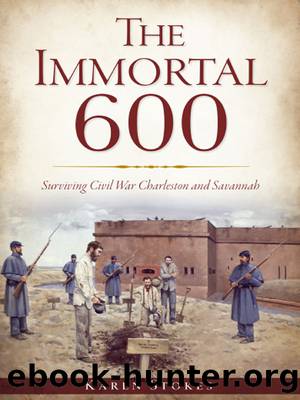The Immortal 600 by Stokes Karen;

Author:Stokes, Karen;
Language: eng
Format: epub
Publisher: Arcadia Publishing
Published: 2013-08-15T00:00:00+00:00
An order issued on September 7, 1864, laid out the rules for the government of the prison camp on Morris Island. According to these regulations, the prisoners were divided into eight detachments of seventy-five men, and each unit of seventy-five was under the charge of a warden. There were three roll calls every dayâthe first at dawn, the second at noon and the third an hour before sunset. No prisoners were allowed to leave their tents after nightfall, and their movements within camp during the day were limited to the area marked out by the rope deadlines. Prisoners who crossed the deadline âunder any pretenceâ would be shot by sentries. Any disturbances or disorder among the prisoners in the camp would also be dealt with by gunfire. The prisoners could write one half-page letter each week, and all their letters were opened and inspected by the provost marshal before leaving the island. As for their meals, breakfast was at 7:00 a.m., dinner at 12:00 p.m. and supper at 5:00 p.m. Captain George W. Nelson remembered that âa little mush or riceâ was issued for supper, but according to John Ogden Murray, the last meal of the day apparently only appeared on paper, at least for some length of time. âOur rations, under this order,â he wrote, âwas a menu for wooden gods.â
It consisted of four hardtack army crackers, often rotten and green with mold, and one ounce of fat meat, issued to us at morning roll call; for dinner, we received one-half pint of bean or rice soup, made as the caprice of the cook suggested; for supper, we were allowed all the wind we could inhaleâ¦Our drinking water was obtained by digging holes in the sand, and then waiting until sufficient very insipid water would ooze out of the sand to quench thirst.
Lieutenant Henry H. Cook noted that âsickness soon began to prevailâ among the prisoners on Morris Island, and some began to suffer from dysentery, an inflammation of the bowels that causes severe diarrhea, spasmodic pains and cramps and bloody discharges.
It must have been especially tantalizing for the captive officers from South Carolina to be so close to home. Captain Thomas Pinckney, who bore one of the most honored family names in South Carolina history, was one of these. He was the great-grandson of Eliza Lucas Pinckney, an important agriculturalist, and the grandson of Rebecca Brewton Motte, a heroine of the Revolution. When the war began, Pinckney raised his own company of cavalry and carried into battle with him the sword his grandfather Major General Thomas Pinckney had used in his service during Americaâs fight for independence from the British as well as the War of 1812. The sword was captured, along with the captain, at the Battle of Haweâs Shop in Virginia by Lieutenant James Ingersoll of Custerâs Division and was not returned to its owner.
Decades after the war, Captain Pinckney penned his âReminiscences,â and at that time, looking through the United States governmentâs official records of
Download
This site does not store any files on its server. We only index and link to content provided by other sites. Please contact the content providers to delete copyright contents if any and email us, we'll remove relevant links or contents immediately.
Our Riches by Kaouther Adimi(622)
Scenes from Provincial Life by J. M. Coetzee(542)
Moxyland by Lauren Beukes(505)
Dreams in a Time of War: A Childhood Memoir by Ngugi Wa Thiong'o(504)
Desgracia by J. M. Coetzee(465)
History of Islam in Africa by Levtzion Nehemia; Pouwels Randall;(400)
Adventures in Poetry by Mary L. Kienholz(400)
Dracula Chronicles: Son of the Dragon by Victor Foia(377)
Moxyland (Angry Robot) by Beukes Lauren(354)
The Last Storytellers: Tales From the Heart of Morocco by Richard Hamilton(303)
Life Times: Stories 1952-2007 by Gordimer Nadine(266)
A Club In Monmartre by Mike Resnick(264)
African Voices of the Global Past: 1500 to the Present by R. Getz Trevor(253)
Bound to Ransom by Kiru Taye(239)
The House on the Borderland: And Other Novels by William Hope Hodgson(234)
Along the Nile by Thyme Lauren O(196)
This Great Wilderness by Eva Seyler(181)
Tarzan the Final Chapters by Edgar Rice Burroughs(171)
Between Silk and Wool by Lena Scholman(158)
